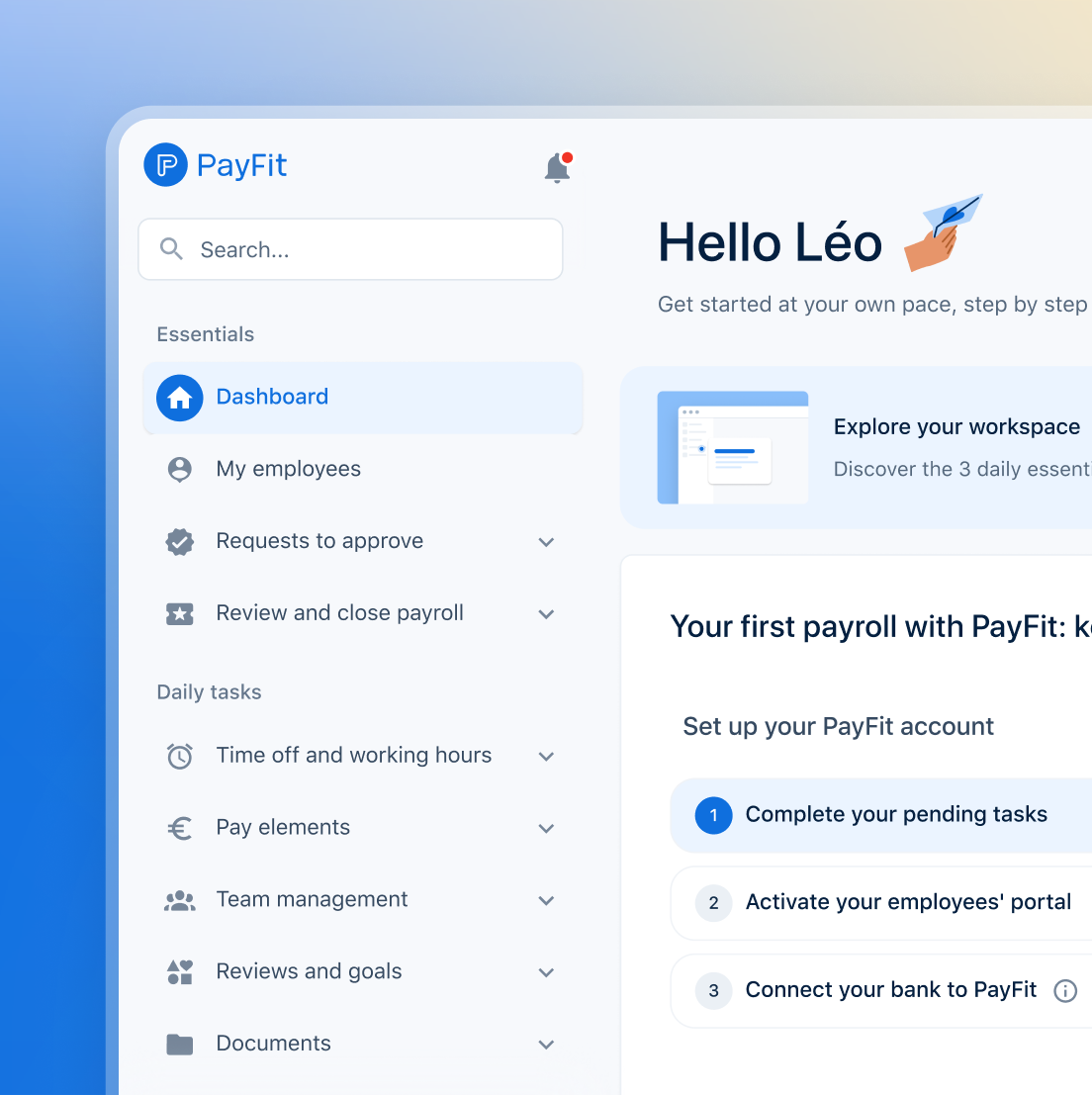✨ Health insurance, now in PayFit - learn more
💷 All the rates & thresholds you need to know for 25/26...right here
✨ The Payroll Journey: Start, Scale & Succeed Globally - learn more
✨ Health insurance, now in PayFit - learn more
💷 All the rates & thresholds you need to know for 25/26...right here
✨ The Payroll Journey: Start, Scale & Succeed Globally - learn more


Outsourcing your payroll may seem like a good idea. After all, you get expert support in a business area that’s often complex and tricky to understand, even for the most seasoned professionals.
But the benefits of owning your payroll fully, in-house, are tenfold. From the control and visibility you get over your people data to the business process improvements that can impact employee wellbeing, there are many advantages to owning your payroll outright.
Let’s explore why owning your payroll is essential, from building greater efficiencies and shaping up security so you’re primed to scale to improving business processes for an enhanced employee experience.
In recent years, outsourcing certain business functions, like payroll, has become a comfortable norm.
Better known as Business Process Outsourcing (or BPO), this involves a third-party provider (like a part or fully-managed payroll bureau service) taking control of processes most companies aren’t fond of managing internally.
Back-office processes have been the primary domain of BPOs - basically, all the activities that companies find too laborious and repetitive to maintain internally. And while this has freed up some time for companies to focus on more meaningful work and provided much-needed expertise, during events like the Pandemic for example, it’s come at a high cost - companies entrusting third parties with their core operations and most sensitive data.
However, a paradigm shift is taking place: an increasing number of businesses are bringing workforce processes back in-house. With new technology at their disposal to help streamline and automate more time-consuming tasks, companies are finding new ways of working which grant them more control, visibility and ownership of these processes while winning back even more time.
This trend is one we foresee playing out over the long term.
For one, employees are becoming increasingly data savvy. They want to know their information is in safe hands (e.g., their company’s, not those of a third party). At the same time, they also want quicker access to their data, whether to request pay advances or extra funds from clocked overtime.
Being plugged into things like mobile - where they can shop, check their bank balance or make a restaurant booking - is also driving the need for more digital transformation in the workplace.
Overall, the employee of tomorrow looks very different from that of today. In order to attract and retain the best talent, companies need to keep up with these digital demands. Sending Excel spreadsheets back and forth to an external provider simply won’t do anymore. It’s time to bring essential business processes back in-house so you can put this data back in the hands of your staff and employees.
Let’s review why owning your payroll is essential in this new, digital business era.
Done right, owning your payroll internally could mean far fewer mistakes slipping through the net. That’s because you have more visibility over everything involved. On the other hand, sending everything back and forth to an outsourced provider usually results in key bits of information getting lost or overlooked. And that can be a costly affair for businesses.
Additionally, outsourced providers are known to charge substantial fees for corrections (on top of time billed to address these). So costs can quickly rack up to a point where making further corrections becomes prohibitive.
External providers also expect employers to do their own error checks before sending everything through; most providers won’t take responsibility for ensuring data is accurate. Among the problems that can occur are delays, miscommunication, and mix-ups leading to errors on payslips or calculations that could trigger an audit if you’re not careful.
Owning your payroll means avoiding many of these costly errors, whether by having greater visibility or using payroll software to automate error-prone tasks like calculations. You can also react to mistakes more quickly, fixing them before any real damage occurs.
When it comes to data, security and confidentiality will only become more mission-critical over time. Regulations are getting tighter, and people are becoming savvier about what it means to share personal information in an online world. Plus, as a business, the accountability and responsibility for keeping data safe and secure lies with you. And this isn’t set to change.
The truth is we, as humans, aren’t perfect. And that’s especially the case when entrusting your payroll to third-party professionals who might be tired, overworked or simply too disengaged in their role to give the appropriate level of care and support.
By owning your own payroll, you can exercise better control over your data. Instead of relying on a third party to store your sensitive information that could be liable to data breaches or unauthorised access, you’re in the driver’s seat. Not only is this more empowering, but it’s also safer - it means your business can implement the proper security measures and protocols (we recommend getting ISO 27001:2022 certified), which you can tailor to your organisation’s specific needs.
Owning your payroll also makes you more flexible. Think about it: because you’re overseeing the process, you get to decide on everything from who’s involved to the deadlines you set. On the other hand, outsourcing payroll is more limiting, as you’ll be working to the standards and deadlines set by another third-party provider.
By bringing payroll in-house, you win back the ability to customise your payroll process and system to align with your company's specific policies and needs. For example, you can align payroll processing with your internal timelines, ensuring employees are paid accurately and on time. And as your organisation evolves, you can adapt this system. Not only this, but it becomes so much easier to hand over your payroll process to new hires when you move on.
Payroll software guide
There’s no getting away from it - efficiency has been quite a hot topic of late. In other words, the economic landscape has shifted, placing greater prevalence on the need to be more cost-effective and profitable as a business.
Now, on the surface, outsourcing might seem like a more cost-efficient solution for business functions like payroll. But dig deeper, and there are hidden fees and costs to outsourcing payroll that can quickly build up. For one, payroll bureaus can take hours to respond, needlessly holding up valuable parts of the workflow. Not to mention these providers are also likely to charge for tasks like running a report (which you can do easily and fee-free with something like payroll software).
With payroll under your roof, you don’t pay a third party for its services (costs that could quickly spiral with inflation). Instead, you gain direct control over the entire payroll process, resulting in streamlined operations and timely payments. And let’s not forget that this can include leveraging the right kind of technology to automate repetitive payroll tasks that are pulling time and attention away from more meaningful work.
Payroll regulations and tax laws can be complex and ever-changing. Non-compliance with these regulations can lead to severe HMRC penalties or legal issues.
Owning your payroll gives you greater control and accountability over compliance. You can keep abreast of the latest legislation, implement necessary changes promptly, and ensure accurate tax filings and reporting. Additionally, managing payroll internally allows for better transparency and documentation, making audits or regulatory inquiries smoother and more manageable. Even better? You can make use of payroll software that comes with compliance already baked in.

Joined-up processes will be an essential aspect of future workforce management. That means having business functions interconnect closely instead of being relegated to silos. Your HR team will need to work well with your finance unit, IT team and so on. And that makes integration a vital part of any forward-thinking strategy.
Keeping your payroll internal means you can more easily integrate these systems with your other software. This results in more accurate and comprehensive reporting, more seamless employee management, and quicker decision-making. Your teams will also have more direct access to data, which they can share, driving deeper analysis to improve overall business performance.
Finally, owning your payroll means you can deliver a better employee experience. To start, having a smoother payroll experience can increase team morale, improve productivity and encourage a more positive work environment in general.
But an improved payroll experience that’s defined internally can significantly impact the overall employee experience as well. For one, it’s more empowering, as employees can participate in and engage more actively with your system. It also provides them better access to their data, whether they need payslips for a mortgage application or a P45 when they’re ready to move on to their next role. Not to mention employees are entirely in control of updating their details (say to a new bank account) without having to reach out to an admin.
On the flip side, if your payment process is fragmented, your employees are more likely to feel frustrated and even seek out opportunities elsewhere if pay is regularly late.
With PayFit, employees can update their bank account details directly on our platform, so payment is always sent to the right place.
In an era where data security, customisation, cost-efficiency, and compliance are paramount, owning your payroll has become essential for organisations. By bringing payroll in-house, you can regain control over sensitive data, better customise processes to fit your unique requirements, achieve cost savings, and ensure compliance while streamlining operations.
Investing in an in-house payroll system is one strategic decision that can improve efficiency, reduce risks, and enhance business performance in the long run.
Keen to know what payroll software could do for your business? Why not book a demo to see PayFit in action with one of our knowledgeable product specialists?


Compare the best payroll software for UK businesses in 2026. Discover solutions to automate compliance, support growth, & manage employees effectively.

Cloud-based payroll software helps UK businesses improve accuracy, reduce errors and maintain HMRC compliance by centralising payroll data and calculations.

Learn how to run payroll in the UK from how to register for PAYE, calculate tax and NI, send RTI submissions on time, to avoiding HMRC penalties.

We cover the principles of UK payroll accounting, as well as National Insurance rates, 2026/27 tax year compliance & how to streamline your financial reporting.

Essential guide for UK managers on payroll in human resource management, covering National Insurance changes, 2026 regulations, and compliance.

Understand exactly what is net pay, how to calculate it, and the latest UK tax and National Insurance changes for affecting your payroll.

See what's new in PayFit
New features to save you time and give you back control. Watch now to see what's possible